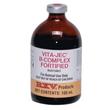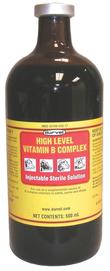Pronunciation
VEYE-tah-min B KOM-plex - Pronunciation guide
Brand Names
- Super B Complex
- Vita-Jec® B-Complex
- Vitamin B Complex 150 Injection
- V.A.L.® Syrup
- Vitamin B Complex 150
- B ComplexVET
Description
 Vitamin B complex is used to prevent and treat vitamin B deficiencies in horses. Injectable prescription B vitamin complex usually contains thiamine, riboflavin, pyridoxine, niacinamide, d-panthenol, and cyanocobalamin.
Vitamin B complex is used to prevent and treat vitamin B deficiencies in horses. Injectable prescription B vitamin complex usually contains thiamine, riboflavin, pyridoxine, niacinamide, d-panthenol, and cyanocobalamin.
The B complex vitamins are water-soluble and reserves are not stored in the body, so daily intake is required. Good quality pasture contains high levels of these vitamins, but cereal grains that make up concentrated ‘hard’ feeds have a low or imbalanced content of natural vitamins.
The vitamin B complex, specifically thiamin (B-1) and B-12, is responsible for the metabolism of the horse’s nutrients, such as fats, proteins, and carbohydrates.
Other B vitamins that assist with the nutrient metabolism are riboflavin (B-2) and pantothenic acid (B-5). Riboflavin is required for the health of the mucous membranes in the digestive tract. Panthothenic acid assists some of the glands and hormones that aid metabolism of nutrients.
If a horse is experiencing vitamin B deficiencies, an injection of the vitamin B complex may help by boosting the metabolism and allowing the horse’s body to use the food it is eating. But if a horse is healthy and not experiencing any deficiency, then an injection of vitamin B would most likely not do much for the horse.
In fact, if a horse is not deficient, an injection of vitamin B complex may be a waste of money because vitamin B is water soluble and any excess is excreted in the urine almost immediately.
Usage
Vitamin B complex is used in the prevention and treatment of conditions associated with vitamin B deficiency. It is most commonly used in animals that are not eating adequately, or have a debilitating disease, liver condition, or long convalescence after major surgery.
B complex vitamins are involved in energy production, digestive and liver function, and blood production. Hard working horses may benefit from supplementary B complex vitamins.
Dosage and Administration
 Vitamin B Complex Vitamin B Complex |
||||
|---|---|---|---|---|
| Method | Dosage (click row for calculator) |
Concentration | Period | Duration |
| Oral (syrup)1 | 1-2 tbs | Each day | As needed | |
| Oral (capsules)2 | 4-8 capsules | Each day | As needed | |
| Intramuscular injection3 | 10-20 ml | See package | 1 or 2 times a week | As needed |
| Intravenous, Intramuscular or Subcutaneous injection3 | 1-5 ml/100lb | 150 mg/ml | 1 or 2 times a week | As needed |
Notes:
|
||||
Following the directions of a veterinarian is very important.
Vitamin B complex can be given in oral or injectable form. It is best to give a daily feed supplement (e.g. powder, paste, or liquid) and administer extra by injection where necessary, usually prior to or immediately after periods of stress, racing, or hard work.
Administer injections of vitamin B complex with caution and keep treated horse under close observation in case of allergic reaction.
Side Effects
Although side effects are uncommon, allergic reaction to the medication may occur. Signs may include facial swelling, hives, scratching, sudden onset of diarrhea, shock, seizures, pale gums, and, in severe cases, coma. Discuss the potential for side effects in your horse with your veterinarian.
Precautions
Vitamin B complex is not for use in horses that are hypersensitive to thiamine or any of the other ingredients. Although some vitamin B complex injectables caution about intravenous use, other products indicate on the package that they may be given intravenously. Always consult with your veterinarian before administration. Anaphylactic reactions to parenteral thiamine HCl have been reported.
Interactions
None reported.
Overdose
Studies have shown a very low order of toxicity if vitamin B complex is used according to instructions.
Images
 Vita-Jec Vitamin B Complex Injection
Vita-Jec Vitamin B Complex Injection
 Vitamin B Complex Injection
Vitamin B Complex Injection
Literature
